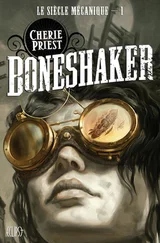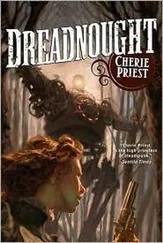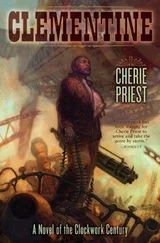“I am speaking, of course, with regards to that peculiar affliction that ruins men—and sometimes women—throughout the continent. You’ve seen the symptoms, or heard of them at least: A yellow tinge to the skin, particularly around the eyes and joints; difficulty breathing; a running nose with bloody mucus; receding gums and protruding teeth; an emaciated, cadaverous appearance; and, eventually, a mindless pursuit of human flesh. And although those who carry the affliction cannot spread it, their bites spread a gangrenous rot that is very often fatal. Among doctors and scientists it’s commonly described as ‘necrotic leprosy’—but this term is not well known outside those circles.
“This—not the war—is the crisis of our time.
“For quite some time, this plague progressed quietly, taking primarily soldiers in its grip, because soldiers were the primary consumers of the substance which is believed to cause the disease: a common, inexpensive drug sometimes called saffron, which is smoked or otherwise inhaled. But increasingly, unaccountably, the situation has worsened to such an extent that thousands are dying by the day—either by drug use and subsequent sickness, or through the cannibalistic assaults that follow. Our troops are being decimated, and the Confederate troops are similarly burdened.
“But this must not be considered a purely military matter. The walking plague is now escaping the uniformed ranks and spilling into civilian society, taking not merely those soldiers who contaminate their bodies with the drug, but also those who struggle to live in the midst of this never-ending war.
“The war must end, and it must end immediately. If it does not, this creeping horror will consume the continent beyond salvation by 1886. Figures in the rest of the world are more uncertain, but rest assured this is not merely a problem of North and South. This is a problem of which the planet must be made aware, and the U.S. must lead by example. The threat is a scientific fact, measurable by advanced calculating engines created by the nation’s top scientists.”
Gideon paused there, and looked up at Nelson Wellers. “I don’t understand why I can’t just name myself. I’m the top scientist. It’s my machine.” He fondly, almost wistfully imagined the Fiddlehead as it’d been before the sabotage—all bright keys and jaunty levers, chewing up numbers and possibilities, offering its direct, complex answers on a roll of paper. Cryptic only to others. Never to him.
“That you are, and that it is. But most people don’t know your name, and those who do might be … disinclined to take your warnings as seriously as you’d like them to be received.”
The wistfulness melted, and he glared across Lincoln’s library in the doctor’s direction. “Because I’m a negro.”
The physician shrugged and shook his head. “It doesn’t help, but that’s not the whole of it. Don’t look at me that way. You’ve taken great pains to remain more or less anonymous. Well, congratulations. No one knows who you are. Your campaign has been a roaring success.”
Gideon glared some more, but didn’t argue. He returned his attention to the handwritten draft before him, and continued reading aloud, his last review before heading off to the papers. “The Union is aware of these scientists and their devices, and President Grant has been advised on the matter.” He looked up again. “Bit of an exaggeration, isn’t it?”
Wellers shrugged again. “Lincoln said he talked to him. Even if he didn’t, or even if their conversation skirted around the issue … the president will surely want an audience with you when your letter goes public. You can brief him then.”
“To explain myself, yes. I expect you’re right—and perhaps it’s an underhanded means of gaining an audience, but it will almost certainly work. Very well. That part stays.”
He picked up where he’d left off. “President Stephens has been informed of the dire situation as well. Though details are not available to the author of this letter, this devastation allegedly affects Southern troops at a rate twice that of Northern ones.”
Wellers held up a finger to interrupt. “You made that part up, yes?”
“More or less. There’s always a chance that the problem isn’t any worse down South, but since virtually all problems are, it’s a safe enough guess. I can’t offer up the Fiddlehead’s figures because the incoming stream was incomplete. The results are speculative, by the machine’s own admission, but within a calculated margin of error.”
Wellers chuckled softly. “You talk about that thing like it has a mind of its own.”
“It does,” Gideon assured him. “It has mine, only better. And besides, I see no good reason to tell the South that their problems aren’t as bad as ours. Let them think they’re taking the brunt of it, assuming we can get this message to go public down there.” He set his papers atop his knee. With more earnestness than he usually felt or showed, he asked, “Do you really think this sounds all right? It feels odd. It doesn’t sound like me at all.”
His companion smiled. “I thought that was the point.”
“Don’t be a jackass.”
Wellers’s smile grew even bigger. “Go on, keep reading. It’s hard for me to judge the document as a whole when you keep stopping like this.”
“You’re judging it?”
“You asked for my opinion, so yes. I’m taking great relish in judging it, because you so rarely care what I think.”
Gideon tried to frown, but couldn’t muster it. “I don’t care what you think. I want to know what you think. It’s not the same thing.”
“And Douglass and Lincoln are away right now, so you’ll settle for me. I’m still flattered to be third place to such company.”
“I’m not trying to put you in their company, Nelson. If—”
Now he laughed outright. “No! No, you can’t take it back now—you’ve flattered me, and you’re just going to have to live with it.”
Gideon gave up and grinned back. “Fine. You’ve been complimented. Don’t get so goddamn excited about it.”
“I’ll try to contain myself. But do go on—finish it up. Let’s hear your closing. The paper offices will shut down in another hour or two, and if you want to get this into tomorrow’s edition, we need to be on our way.”
Gideon cleared his throat and picked up the papers again. He scanned the last few lines and began afresh. “In Washington, D.C., luminaries such as Abraham Lincoln and Frederick Douglass are calling for an immediate cease-fire in order to discuss the pressing threat which all of us face. In Richmond, the renowned hospital manager Captain Sally Louisa Tompkins is aware of the situation and has made efforts to rouse the CSA’s own Congress, to limited success. For make no mistake: There are those who wish the war to continue.
“Though it may sound ridiculous, inhumane, or impossible, there is money to be made in a war—huge money, for people without ethics or sentiment. These people have always existed, and they will always stand in the way of peace, for they are powerful. But we are more powerful still.
“Now is the time to call for action. Rally your representatives, petition your governors, and refuse to stand by in the face of indifference. Silence is not our friend, and it will not protect us. Only through public inspection and open discourse can we combat this problem, and we must do it together—Northerner and Southerner, white and colored, Indian and Texian, blue and gray. We are all human, and all living, breathing men. We must act accordingly, lest our entire species be eradicated from the face of the earth.”
After a pause, Wellers nodded and gave a round of formal, steady applause. “I like it. And that is a fierce climax indeed, at the end of an impassioned call to arms.”
Читать дальше










